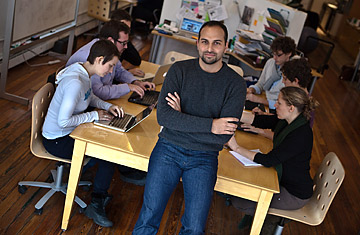
Ricken Patel, the founder of Avaaz, poses in the group's New York City offices on Jan. 13, 2011
It was the dead of night in the besieged Syrian town of Homs in late February, but lights were still on two floors up in a brick building off Manhattan's Union Square. There, in an office decorated with children's drawings, sat one of the most unlikely players in the yearlong Syrian revolt: Ricken Patel, 35, head of the Internet activist organization Avaaz.
The Canadian is no diplomat or elected representative, but he has managed to insert his group into the eye of the storm in the Arab Spring's bloodiest conflict yet. The bookish Patel, with degrees from Oxford and Harvard, has a tendency to talk at length about history and politics, but the weapon he wields is information technology in the hands of several million online activists. Their passion and contributions have enabled Avaaz to organize a steady stream of video footage from inside Syria that has helped form the Western picture of the brutality unfolding on the ground. The network has also smuggled dozens of foreign journalists into the country, including most of those featured in TIME's cover story "Escape from Syria."
"It's the wisdom of the crowd," Patel says during a long interview, over several cups of green tea. "Our members vote with their feet. Anything that goes out from Avaaz is only as strong as the depth of the members' involvement."
Patel did not envision Arab revolutions when he first dreamed up Avaaz. In 2003, he was freshly arrived in New York City after a stint in Afghanistan for the International Crisis Group, a Brussels-based advocacy organization, and was intrigued by the buzz around MoveOn.org, an activist movement campaigning against the U.S. Patriot Act. Patel began toying with starting a similar group geared toward global issues. In 2007, he launched Avaaz (the Farsi word for voice), registered in the U.S. as a nonprofit corporation, with a hugely ambitious mission statement: "to close the gap between the world we have and the world most people everywhere want."
Patel believed that "most people everywhere" encompassed a fast-growing number who were wired, frustrated and looking to jolt the status quo. His aim was to sign them up to a range of issues. Potential campaigns would be launched only if more than 80% of a randomized sampling of 10,000 members wanted it. "There's a world we all want and there's a deficit of those values," he says. "I'd always dreamed of this notion of global citizenship."
Indeed, Syria is just one of dozens of campaigns the organization has under way right now. Avaaz has raised about $30 million from members over its five-year existence and signed up about 20 million people, of which Patel claims about 13 million are "active" — by which he means that they give money, sign petitions and meet in groups off-line. Donations and membership double roughly every 12 months, and Patel says he plans to increase his paid staff in April, from 46 to 85.
Avaaz's real organizational strength, however, is its ability to rapidly mobilize huge numbers of people at short notice. During the 2009 Green Movement uprising in Iran, for example, Avaaz set up a network of proxy servers to allow protesters to post videos from the streets.
By the sheer force of its numbers, Avaaz can also bombard its targets with mass petitions, which can produce results among those more sensitive to public opinion. Its website boasts, for example, that a petition signed by 317,000 members helped prod Hilton Hotels to implement sex-trafficking training for staff, although the company tells TIME that it was "already actively engaged" in the process of signing up to an industry code of conduct on the issue when Avaaz launched its petition.
